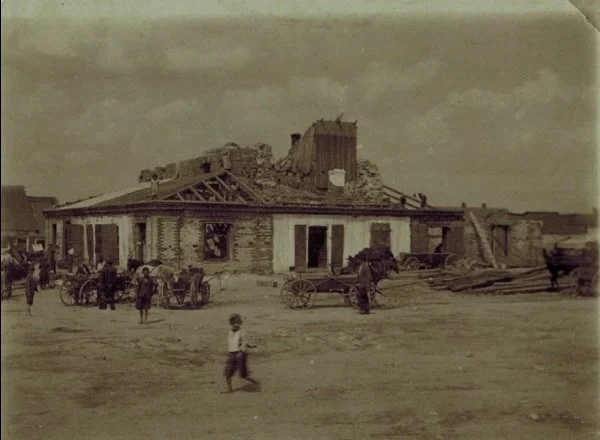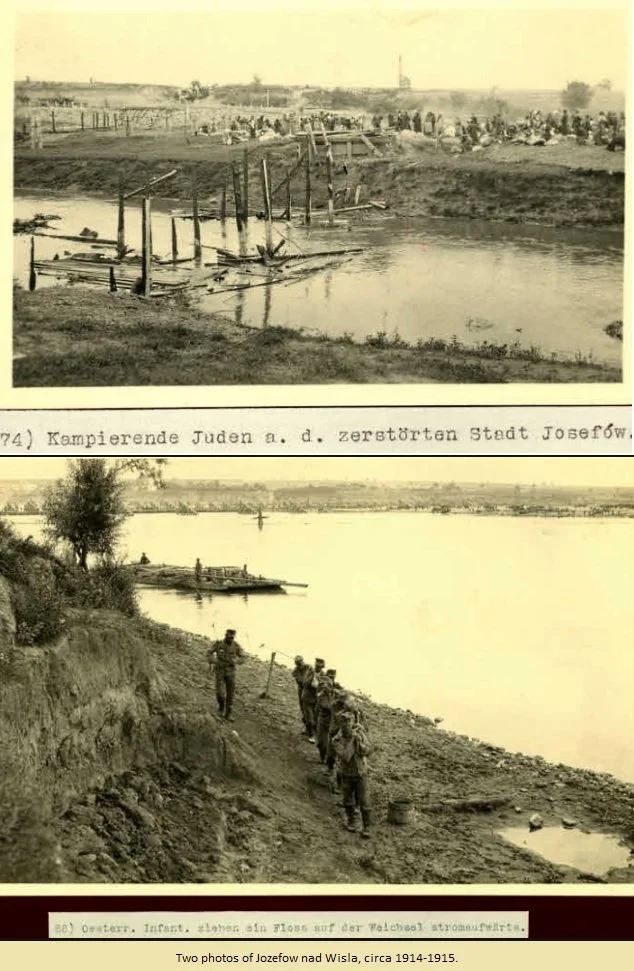Remember Jewish Jozefow nad Wisla
Pronunciation: Yosefov nad Visla
HISTORY OF JEWISH JOZEFOW NAD WISLA
Jozefow on the Vistula River, called Jozefow nad Wisla, was established in the first half of the 18th century; it was owned by the Zamoyski family. Jews had settled in the town prior to this in the late 1600s. They established a wooden synagogue and a cemetery, which was located outside the city, south-east of the market square. Currently the location of the Jewish cemetery is a garbage dump; despite this, some grave markers (matzevot) are still visible. The Jewish population was 845 in 1765; by 1792, it was 590; by 1861, it numbered 1,454. By 1921, there were only 736 Jews in town. In 1939, the Jewish pop. was between 800 and 1,000. There are several Jozefows in the Lublin district, including Jozefow near Bilgoraj and Jozefow nad Wisla.
The original synagogue burned down in 1729 and was located north-east of the market square; the new synagogue that was built was also destroyed by a fire in 1823. This synagogue survived until the 1960s, when it was demolished. The synagogue was built on a rectangular plan, was two stories, was made of stone and brick, and was supported by sloping escarpments. On the north side, there was a vestibule leading to a square prayer hall, decorated with poly-chrome with figure motifs created around the middle of the 19th century. At least since 1864, a brick ritual bathhouse (mikveh) existed in Jozefow nad Wisla and was located on the Vistula River.
In the 18th and 19th centuries, Jews constituted the majority of Jozefow nad Wisla's inhabitants and played a crucial role in the economic development of the center. There was no separate Jewish district in the town. A significant proportion of the Jews lived on Walowa Street (also known as ul. Zydowska), which was located to the west of the market and ran parallel to the Vistula River.
At least from 1730, there were breweries and granaries in Jozefow nad Wisla owned by Jewish entrepreneurs. At the end of the 1890s, there were many Jewish shops including a tool shop, paper mill and three Jewish-owned taverns. At the beginning of the 19th century, the paper mill was leased by the Wax family; the town became an important center for printing within Jewish communities in Europe. In fact, half of the local inhabitants earned their living by printing and selling religious books in Hebrew during this time period. Many of the books were exported to other European countries and even to Turkey. However, a few decades later, the printing house went bankrupt as it could not compete effectively with modern printing houses in Lublin, Warsaw and Vilnius. Equally detrimental was Russian censorship.
At the beginning of the 1920s, Jews constituted about 67% of the settlement's population. Under the management of the commune there was a synagogue, a house of prayer, a mikvah and a Jewish cemetery. During the interwar period, Jewish political parties were created in the city, including the Aguda branch, founded in 1930. In 1930, the city employees included Dawid Morensztajn (secretary/ritual slaughterer), Symcha Binem Liberman (ritual slaughterer), Majer Szmuel Michlewicz (ritual slaughterer), and Rabbi Chil Uszer Epsztajn.
JOZEFOW NAD WISLA DURING THE HOLOCAUST
Not much is known about the Jozefow nad Wisla ghetto due to the lack of survivor testimony from the locale. In December, 1939, 300 Jews from Jozefow nad Wisla were deported to nearby Opole Lubelskie. During the Nazi occupation, there were two labor camps in Jozefow -- one in the synagogue and another in a school building. The synagogue labor camp had around 300 workers who created embankments in the village of Rybitwy (construction works) -- and it existed until March of 1942. The school-based labor cam existed between May and October of 1941 and included Jewish workers from not only Poland but also Austria and Germany. This indicates that there were deportations of Jews from Austria and Germany who ended up in Jozefow nad Wisla. On March 9, 1941, a group of 500 to 1,000 Jews from Konin (Lodz district) -- who were mostly poor or elderly (or both) -- were dispatched by train to Jozefow nad Wisla.
The estimated ghetto population at this time was 1,500 to 2,000 Jews. On May 9, 1942, the Jewish population that remained in the Jozefow nad Wisla ghetto -- a total of approximately 1,270 individuals -- were deported to the ghetto in Opole Lubelskie, from which they were sent to the Sobibor gas chambers.
Jews no longer existed in Jozefow nad Wisla and the Jewish population was never reconstituted.
Jews in Opole Lubelskie ghetto, which was nearby and a deportation locale from Jozefow nad Wisla, were four times sent to the gas chambers: 1) On March 31, 1942, 1,950 Jews were deported to Belzec gas chambers; 2) In November, 1942, 3,000 Jews were sent to Belzec; 3) on May 12, 1942, 2,000 Jews from Opole Lubelskie ghetto and Naleczow labor camp were sent to Sobibor gas chambers; and 4) another group of 2,000 Jews was sent to Sobibor on May 25, 1942 from the Opole Lubelskie ghetto. Jews from Slovakia, Austria, Germany, and various parts of Poland were on these transports.
Please review the site content below. Zachor - We Remember.
------------------------------------------------------------------------
[Jozefow Facebook group for Jewish research]
[Jewish cemetery — Jozefow nad Wisla]
------------------------------------------------------------------------
LINKS
Town of Jozefow nad Wisla:
Join the Jozefow nad Wisla Jewish research group on Facebook
Rabbis of Jozefow nad Wisla:
- Chil Uszer Epsztajn
- Yehiel Isaiah ben Aron Wajnberg
Remember Your Family:
Central Judaica Database - Museum of History of Polish Jews
Grandchildren of Holocaust Survivors on Facebook
Guide to the YIVO Archives
Holocaust News/Events from Generations of the Shoah Int'l
Holocaust Survivors and Victims Database
JewishGen Family Finder
JewishGen Holocaust Database
JRI-Poland: Search for Your Family
Museum of History of Polish Jews Introduction
Yad Vashem: Search for Your Family
Yad Vashem: Submit Names of Your Family Members
Yad Vashem Requests Photos of Shoah Survivors and Families
CONTACTS
U.S.: LublinJewish@gmail.com

